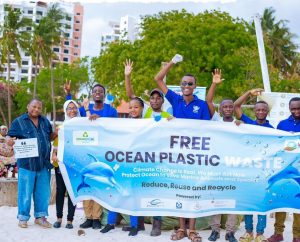Impact Stories of the Global Youth Take Action, 2nd edition
The International Secretariat for Water, in partnership with the Global Water Partnership and the Central Asia Youth for Water Network, launched the Global Youth Take Action (2nd edition) call for projects in June 2021. The nine youth-led projects are now completed and have impacted hundreds of communities.
In response to the growing need for innovative financing mechanisms for young leaders in the water and climate sector, this call aimed to connect young activists with financial resources and mentoring to support the implementation of inspiring local initiatives. The financial support was combined with a tailored capacity-building program and a simplified monitoring and evaluation framework adapted to the needs of the young leaders. For most grantees, this was their first experience receiving such financial support.
The main goal of this call for solution: Tackling water challenges enhanced by the climate change crisis in the most vulnerable and marginalized communities.
Amongst hundreds of projects submitted from over 70 countries, nine projects were selected by our jury members to receive a seed funding of 5000CA$.
After several months of hard work, we are glad to announce that all nine projects selected have successfully been completed (or will be completed shortly). We applaud the ingenuity, resilience and adaptation skills that these young passionate water leaders have shown throughout this journey, developing long-lasting relationships and partnerships with several local and regional stakeholders.
Healthy Environment for Better Education (Tanzania)
Led by the Arena Recycling Industry, this initiative allowed 4300 students from the Buza primary school in Dar es salaam, Tanzania, to gain access to proper water and sanitation services. The team, led by Mrs. Hellen Sailas, used an innovative sand polymer technology to build and install 5000L water tanks for handwashing, 6 pit latrines and 1 changing room for girls. Furthermore, 3000 students from Buza primary school increased their awareness on the importance of proper sanitation and waste management practices through specific training.
“Lack of water has been a big challenge, especially for us girls when we are in the menstruation period, sometimes we feel like not going to school during this time. We thank the Arena Recycling Industry for the installation of water tanks that will help us a lot for the storage of water.” -Aisha Than, Student of Buza primary school
This project also addressed the issue of plastic waste management in Dar es salaam, where over 2900 tons of plastic waste end up in the waterways on a daily basis. To build the toilet and water tank, the team produced Eco-Bricks by upcycling plastic waste collected during community-led clean ups. During this phase of the project, 200 community members gained key knowledge on plastic waste management.
In the coming year, Arena Recycling aims to scale up its initiative by increasing its production capacity from 200 bricks per day to 1000 bricks per day, allowing the recycling of 2-3 tons of plastic waste on a daily basis. In the long term, this youth-led initiative will impact the lives of thousands of students all over Tanzania, allowing them to gain access to quality water and sanitation services while reducing the plastic waste in their communities.
Arena Recycling recently received the title of Start-Up of the Year by TotalEnergies Tanzania LimitedChallenge.
WASH solutions for improving access to basic obstetrics services for pregnant women in rural communities in Imo state (Nigeria)
This project, implemented by Women Act Solutions under the leadership of Mrs. Chinonyerem-Oleru, aimed to reduce mortality rates in rural communities of Imo State, Nigeria, by improving the patronage of Primary Healthcare Centers for uptake of quality basic obstetrics services by pregnant women.

Over the past months, the team of inspiring young women has mobilized civil society actors including community groups and women groups to drive collective actions around improving the conditions of Primary Healthcare Centers. The studies conducted revealed the underlying budgetary causes of the poor conditions of these centers, which enabled community groups and their civil society partners to develop a streamlined advocacy focus to address identified issues.
Women Act Solutions secured actionable commitments from top political office holders to provide funds for the renovation of Primary Healthcare Centers. The Hon. Commissioner for Health committed to commence renovation of 306 healthcare centers across the state. Currently, an initial NGN 600,000.00 (six hundred thousand naira) has been disbursed to the accounts of the 306 Primary Healthcare Centers selected for renovation, and community groups have confirmed the commencement of renovation works across those facilities.
As a result of the project, community groups, including Ward Development Committees, have been mobilized and trained on how to carry out monitoring/supervision of services across their healthcare centers. The sustained pressure from the monitoring activities of the Ward Development Committee will ensure that the government continues to prioritize funding for healthcare centers as it is recognized as one of the top priorities for community groups.
While the government has commenced the renovation of 306 healthcare centers in the state, there are still about 499 centers that need to be renovated. More than half the population of rural women in the state still struggle to access quality basic obstetrics services. Women Act Solutions hope to scale the outcomes of this project to ensure that all Primary Healthcare Centers receive adequate funding.
WASH CAMP USAV (Benin)
Led by Un Samedi au Village, the USAV WASH CAMP project offered a 3-day intensive training to 40 young leaders from over 20 youth-led organizations in Bénin. The youth received training on various WASH-related topics and waterborne disease prevention to carry out their own WASH-related activities in their communities. During the workshop, they co-created specific projects with other young leaders which they would later implement in their own communities. Of the 40 participants, over 57% were women and 5% were people with physical handicaps.
“I’ve made a commitment to be the bearer of the message in my community. From this experience, I understood that many of the diseases and infections that decimate thousands of people every year could have been avoided if only we would work to clean up our living environment and adopt good hygiene practices.” – Monsieur AYENAN Salem, participant du WASH CAMP USAV
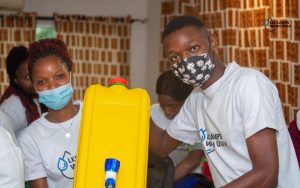
Following the workshop, the 20 participating organizations led their own WASH-related activities in their communities, supported by the team at Un Samedi Au Village. A capitalization workshop bringing together all actors and participants, highlighted the success and lessons learned. These organizations and young leaders have now become WASH ambassadors in their respective communities. Un Samedi Au Village hopes to replicate this approach in the other 10 departments of Bénin.
Bindu – Drops (Sri Lanka)
Led by Tharika Fernando, a civil engineering graduate and founder of Today for Tomorrow, the Bindu Drops, the project has provided access to safe water to 13 households of the Puttalam village by connecting them to the rural water supply network. The team has also identified the locations for the rainwater harvesting tanks which will be installed shortly. A washroom will also be built for the local primary school. As Sri Lanka is facing its worst economic crisis since its independence in 1948, Tharika and her team have overcome significant challenges to pursue the implementation of this initiative. As the economic crisis is now spiraling into a food crisis, the Today for Tomorrow team will pursue their work with local communities to support them in accessing basic needs.
Proyecto Madre Tierra (Colombia)
This project, led by Lina Yaneth Penata Florez, a member of the Indígena Zenu Nuevo Caribia Nuer community in Antioquia, Colombia, aimed to reduce climate-related risks of water contamination used for domestic consumption by training young female indigenous leaders in sustainable water resource management and climate change adaptation.
Twenty young indigenous women from the Zenu Nuevo Caribia Nuer community received training in leadership, climate change, water source protection, forest management and ecosystem-based adaptation.
Furthermore, this project restored and protected 3 hectares of forest on the banks of the El Corcobao stream by planting 1200 native trees. In the long term, it will reduce the risks of water contamination by ensuring the protection of El Corcobao stream and its biodiversity. Lina’s team aims to continue its project with the objective of restoring and conserving all 15 hectares of forest in the community.
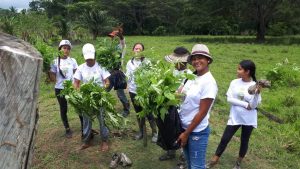
Un Hogar Potable (Venezuela)
This project aimed to improve the standard of living of vulnerable communities of the San Cristóbal and Junín Municipalities by providing them with technical training and mentoring regarding the construction and commercialization of Bio Sand Filters.
Through this project led by Gabriel Eduardo Bohorquez Gamboa of the Organización Venezolana de Jóvenes para las Naciones Unidas (OVJNU), 60 families living in the border zone between Venezuela and Colombia learned the methodologies to conduct water treatment processes at home and learned how to build BioSand filters.
Receiving mentorship regarding social entrepreneurship combined with specific skills related to water treatment processes, the sixty women-led households now have a Bio Sand Filter providing them with approximately 70 liters of clean water per day and can now contribute to the economic well-being of their household.
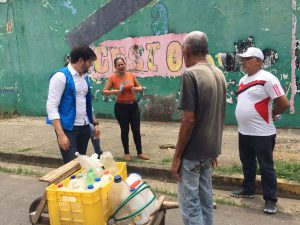
Recognized by the Government of Colombia for its innovative social entrepreneurship model, Gabriel and his team have developed a sustainable financial, environmental and social initiative that will benefit thousands of households in vulnerable communities in years to come.
Water leaders of Kazakhstan (Kazakhstan)
In Kazakhstan, 45% of the water resources come from neighboring countries (Kyrgyzstan, Uzbekistan, Russia and China) making the communities highly vulnerable to poor water quality and scarce water availability.
The objective of the project, led by Aigerim Karibay, is to increase the number of students who choose to pursue a career in the water sector. To do so, the team organized an awareness campaign on the variety of professions and employment opportunities in different areas in the water sector.
By producing a short informative video on the subject which has been disseminated in several universities, hundreds of youth have increased their awareness on the several different career pathways that exist in the water sector in Kazakhstan. In the long term, this project will help ensure that a significant number of qualified young professionals help address the significant water issues which the country is facing.
This project was implemented in collaboration with CAY4W Network.
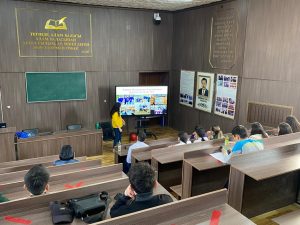
Pure Water (Uzbekistan)
This project, led by Bunyod Igamberdiev, took place in the Fergana Valley and in the Khorezm region of Uzbekistan. Through the organization of 17 educational seminars for rural households and youth, 545 people (including 267 women) gained valuable knowledge on the water supply system, the quality of drinking water, causes of water poisoning, and diseases resulting from the consumption of poor quality water. Modern and traditional, as well as “do it yourself” methods of water purification in extreme conditions were demonstrated. Some participants with a piped water supply were almost confident in the purity of the drinking water they consume every day and were surprised to hear that tap water also needs to be treated before use.
The entire project was aimed at promoting the consumption of quality water and raising awareness among various groups of the population. The participants understood the importance of caring for natural resources. As a large number of participants were teachers from rural schools, the team hopes that the teachers will disseminate the information amongst thousands of young students.
Two months after the workshops, 64% of participants confirmed that they are following the recommendations on consuming cleaner drinking water.
This project was implemented in collaboration with CAY4W Network.
Ensuring access to safe water resources (Cameroon)
Updates to come!
This project was funded by the Global Water Partnership and implemented in collaboration with Global Water Partnership – Central Africa.
CONCLUSION
These projects show that youth are taking effective action to ensure sustainable water management in hundreds of communities. When youth have access to adequate technical and financial support, they can positively impact the lives of thousands of people from the most vulnerable and marginalized communities around the globe.
These solutions are a source of inspiration and motivation to other youth around the world who want to take action. The impact of this call for the project also highlights the need for organizations and institutions to increase the funding allocated to youth in the water and climate sector through simplified and accessible mechanisms.
This initiative is funded by the Swiss Agency for Development and Cooperation (SDC), Agence de l’eau Artois-Picardie (AEAP), Montréal International and Global Water Partnership (GWP).

